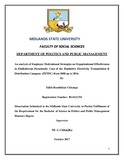Please use this identifier to cite or link to this item:
https://cris.library.msu.ac.zw//handle/11408/3118| Title: | An analysis of employee motivational strategies on organizational effectiveness in Zimbabwean parastatals: case of the Zimbabwe Electricity Transmission & Distribution Company (ZETDC) from 2008 up to 2016. | Authors: | Chisango, Edith Rumbidzai | Keywords: | Employee motivation Organizational effectiveness |
Issue Date: | 2017 | Publisher: | Midlands State University | Abstract: | Employee motivation is an essential tool in promoting organizational effectiveness. Basically, motivational strategies are factors that rejuvenate the degree of employees’ commitment. At the same time organizational effectiveness denotes the ability of an organization to fulfill its required obligations. ZETDC has been perceived by its clients as rude, incompetent and negligent thus leading to corporate damage. The attitudes and behaviors of employees at ZETDC have been expressed through unethical practices such as corruption, bribery, fraud, negligence towards customers and running of entrepreneurial businesses hence threatening achieving ZETDC’s objectives. The purpose of this research paper was to examine the effectiveness of current employee motivational strategies at the Zimbabwe Electricity Transmission & Distribution Company (ZETDC) and establish the relationship between organizational effectiveness and employee motivation. Nevertheless, the findings were that ZETDC’s motivation strategies only favour a minority group, particularly top level employees, and the effectiveness of the organization is largely hindered by lack of motivated employees who form the majority of workforces. In all public sector organizations, motivation either intrinsic or extrinsic essentially contributes to employee satisfaction and thus enhances productivity and organizational effectiveness. The study concluded that ZETDC is lacking motivated employees to attract commitment and hence recommendations were proffered to change employees’ attitudes towards goal attainment. The more employees are empowered, treated fairly and with their efforts appreciated, the more they become more committed to achieving organizational goals. Again, engaging all employees in training and development programs motivates them to proficiently and passionately carry out new points of challenges and also helps in self-development. At the same time, salary delays and stopping of overtime payments are dissatisfying and can only attract unethical survival strategies hence jeopardizing organizational efficiency and effectiveness. The study utilised the mixed method approach where a mixture of both qualitative and quantitative techniques was used in the collection and presentation of data. Questionnaires, interviews, documentary review and observations were used to collect data. For data presentation and analysis, results of assessment were categorized according to themes and at the same time, data that relates to the measuring instrument was summarized by means of tabulation, charts and graphical representations. All necessary ethical considerations were observed throughout the research. | URI: | http://hdl.handle.net/11408/3118 |
| Appears in Collections: | Bachelor Of Science In Politics And Public Management Honours Degree |
Files in This Item:
| File | Description | Size | Format | |
|---|---|---|---|---|
| R141213M.pdf | Full Text | 2.08 MB | Adobe PDF |  View/Open |
Page view(s)
198
checked on Mar 2, 2026
Download(s)
726
checked on Mar 2, 2026
Google ScholarTM
Check
Items in MSUIR are protected by copyright, with all rights reserved, unless otherwise indicated.



